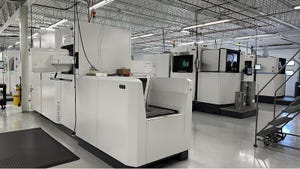Revised design will help reduce power losses to increase battery range and improve EV performance.

Renesas Electronics Corp. has developed a new generation of Si-IGBTs (Silicon Insulated Gate Bipolar Transistors) for next-generation electric vehicle (EVs) inverters. The silicon-based AE5 process for IGBTs achieve a 10% reduction in power losses compared to the company’s current-generation AE4 products. Renesas expects the power savings from the new IGBTs to help EV developers save battery power and increase driving range. The company says the new products are approximately 10% smaller than their predecessors.
According to Renesas, the new IGBTs significantly improve performance and safety as modules by minimizing parameter variations among the IGBTs and providing stability when operating IGBTs in parallel. These features provide engineers greater flexibility to design smaller inverters that achieve high performance.
The IGBT series includes four products targeting 400 to 800 V inverters: 750 V withstand voltage (220 A and 300 A) and 1200V withstand voltage (150 A and 200A). The IGBTs operate over a junction temperature range of -40°C to 175°C, and maintain performance characteristics at an on-voltage Vce (saturation voltage) of 1.3 V. The devices maintain a reverse bias safe operating area (RBSOA) with a maximum Ic current pulse of 600 A at 175°C junction temperature, and exhibit a short circuit withstand time of 4 µs at 400 V.
The IGBTs’ small chip size (100 mm2/300 A) optimizes for low power losses and high input resistance. The chip design achieves a 50% reduction in the temperature dependence of gate resistance (Rg). This in turn minimizes switching losses at high temperatures, spike voltage at low temperatures, and short circuit withstand time, supporting high performance designs. The devices provide slightly higher power efficiency over their predecessors at the same current density, allowing EVs to drive longer distances and use fewer batteries.
Renesas will mass produce the AE5-generation IGBTs in the first half of 2023 on Renesas’ 200- and 300-mm wafer lines at the company’s factory in Naka, Japan. Later, Renesas will ramp up production starting in the first half of 2024 at its new 300-mm wafer fab in Kofu, Japan.
To assist developers, Renesas offers the xEV Inverter Reference Solution, a working hardware reference design that combines an IGBT, microcontroller, power management IC (PMIC), gate driver IC, and fast recovery diode (FRD). Renesas also offers the xEV Inverter Kit, which is a hardware implementation of the reference design. Renesas plans to add the new-generation IGBTs to these hardware and software development kits to enable even better power efficiency and performance in a smaller footprint.
Samples of the 750 V withstand voltage version with 300 A are now available.
Spencer Chin is a Senior Editor for Design News covering the electronics beat. He has many years of experience covering developments in components, semiconductors, subsystems, power, and other facets of electronics from both a business/supply-chain and technology perspective. He can be reached at [email protected].
About the Author(s)
You May Also Like





